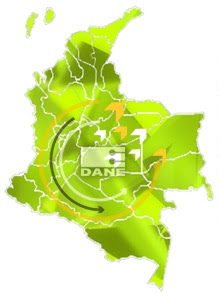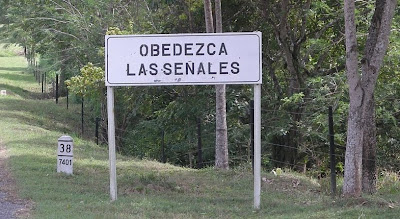
This friendly handshake is how corruption may appear, both in Sweden and in Colombia. The illustration is on the cover of a most interesting official report:
The structure of corruption in Sweden [in Swedish]. The report describes common "Swedish" forms of corruption. In principle they do not differ much from Colombian forms. The roles are the same - and there are at least two characters, a suborner and a corrupt person. There may be others as well: middlemen, hatchet men, and ... lawyers.
The differences are in the use of threats, extorsion or violence, the level of discretion, and the sheer size of it.
In Sweden bribery is usually quite subtile, demands are often not specified and bribes come afterwards. If discovered one can pretend it was a grateful gift, not a precondition for, e.g. a contract. It might still be against the codes, but it is difficult to prove any criminal act.
In Colombia things are otherwise. The economy of bribery is substantial. In an
interview in El Tiempo (11 Jan 2010) Oscar Ortíz, the government's
zar anticorrupción, estimates that bribes in 2009 amounted to 4 billion pesos, equivalent to
all direct foreign investment in Colombia. This is enormous. In order to get a public contract to build a bridge, a school, maintain roads, provide school lunches or health services ... contractors have to pay an average of 12.9% in bribes.
This is the situation at all levels, when building highways in Bogotá - and when repairing the school lavatory in a remote village. And the scale of it, 12.9% of all public investments. Enough to pay for the education of 325.000 children!
However, the more widely known and perceptible corruption in Colombia is about unlawful influences, sometimes achieved through violence, harassment and threats, but very often they are part of mutual agreements, trading of favours, clientilism and nepotism. This explains why the chief paramilitary leader Salvatore Mancuso could triumphantly declare after the 2006 elections that his organisation now controlled 35% of the congress. He has proven to be right, which I shall probably want to show in future columns.
We are coming closer to today's target: strange things happened before the
presidential elections in 2006. As now it was not in accordance with the constitution to reelect the president - then as now Alvaro Uribe. Attempts were made to change the rules, but failure seemed unevitable. The final battle would be in the 1st commission of the Congress, but there was a deadlock. Voting was postponed, talks went on and on - and at last the vote: surprise, surprise, in favour of allowing reelection! One of the representatives had changed her mind and was now in favour, Yidis Medina. Another was absent, Teodolindo Avendaño. This happened in 2004, and preparations for the 2006 (re-)election could continue.
Uribe was elected. His political allies were in control of the Congress. Many of these allies depended on paramilitary support for their success in the parliamentary elections.
Then, in 2008 the independent television channel
Noticias Uno broadcast an interview with Yidis Medina, recorded in 2004 [watch in
Youtube].
In the interview Medina tells how she traded her vote for favours, contracts, jobs to her political allies and personal friends. She had agreed to record the interview as an insurance, it would only be broadcast in case something happened to her. In 2008, 4 years later, she decided to release the interview as a revenge, as president Uribe and his collaborators had not fulfilled their promises to her. She told in considerable detail what persons had been involved, among them were various ministers including the minister of justice Sabas Pretelt, later ambassador in Italy and recently appointed director og the UN World Food Programme - as well as president Uribe himself.
Yidis Medina was of course arrested, as she had confessed. Also Avendaño and his collaborator Iván Díaz Mateus were arrested. The Supreme Court gave them prison sentences of 4, 8 and 6 years, respectively.
The president and his people denied everything. They certainly had not committed any bribery, and Uribe said about Medina that she acted as a criminal, and that "her vote helped but now she appears as a failed woman, unsatisfied because her extortion attempt did not work."
So, here we have a strange case with three corrupt members of congress condemned for receiving bribes, but noone has ever been found guilty of the bribery. And Yidis Medina's important vote was not invalidated, so the constitution still permits reelection, once. And Uribe still rules.
PS. The headline "Bribery, Corruption Also" is also the title of a novel by H.R.F. Keating. One of the book's themes might be called "the ethics of bribery".
 The Constitutional Court has decided not to accept the planned referendum that sought to legalise a second reelection of president Uribe. This, for once, is positive news from those upper circles: The juridical system has shown its independence. It has done so in spite of Uribe's attempts to place his own people in central positions in the juridical system. The most recent of these was precisely the president of the Constitutional Court, who came from a post as juridical secretary — to the president! He was one of the two in the 7-2 vote today.
The Constitutional Court has decided not to accept the planned referendum that sought to legalise a second reelection of president Uribe. This, for once, is positive news from those upper circles: The juridical system has shown its independence. It has done so in spite of Uribe's attempts to place his own people in central positions in the juridical system. The most recent of these was precisely the president of the Constitutional Court, who came from a post as juridical secretary — to the president! He was one of the two in the 7-2 vote today.











 This friendly handshake is how corruption may appear, both in Sweden and in Colombia. The illustration is on the cover of a most interesting official report:
This friendly handshake is how corruption may appear, both in Sweden and in Colombia. The illustration is on the cover of a most interesting official report:  The three levels of lies come to mind when I read statistics on the Colombian labour market - as an example.
The three levels of lies come to mind when I read statistics on the Colombian labour market - as an example. 